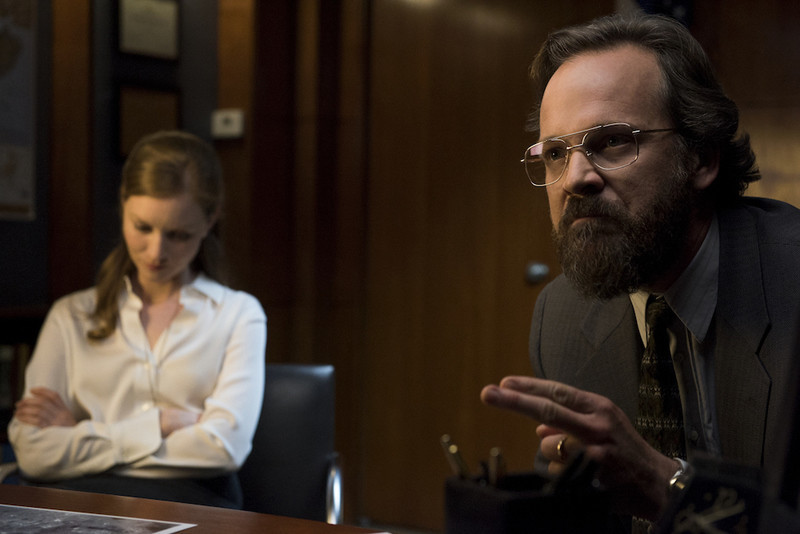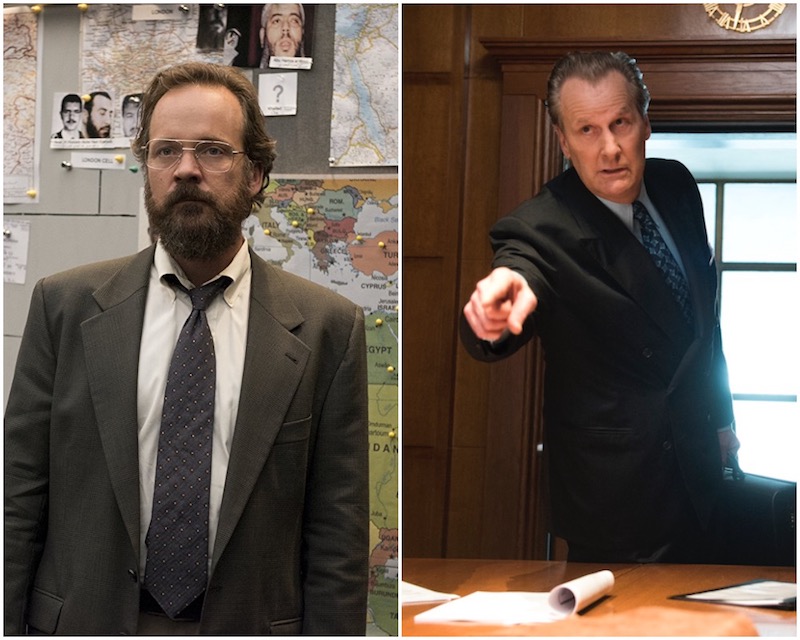Hulu’s new series, “The Looming Tower,” is based on Lawrence Wright’s Pulitzer Prize winning non-fiction book about the US intelligence agencies in the years before 9/11. His focus is on the rivalry between the heads of the FBI and CIA operations investigating Osama Bin Laden and the rise of Al-Qaeda and how their unwillingness to share information made it impossible to prevent the attack. In the series, adapted by “Capote” screenwriter Dan Futterman, Peter Sarsgaard plays CIA Analyst Martin Schmidt, a fictionalized character, and Jeff Daniels plays John O’Neill, Special Agent in Charge of the FBI’s counter-terrorism operation, who was killed on 9/11 in the World Trade Center.
In an interview with RogerEbert.com, Sarsgaard, Wright, and Daniels talked about the personal and professional animosity that kept the investigators from cooperating and why now could be the time for a deeper look at what happened.

O’Neill is described as not wanting to go home, and we see that he has an estranged wife and two girlfriends who do not know about each other. What does that say about him?
JEFF DANIELS: He may not know where home is. One of his partners told me that to John number one in his life was the FBI; everything else was a distant second and that included family and relationships and all of that. He seemed to be on the move all the time so maybe he was trying to get there. I think the one relationship he has that has some goodness in it is with Liz the teacher and I think as the season goes you can see him searching to find his way to that but it’s difficult for him.
What do we learn by seeing him in the Catholic church but not participating in the service?
He was raised with a solid Catholic upbringing and then he found out what life had to offer: whiskey, women. As one of his partners says, he gulped life and that doesn’t necessarily go with the Catholic doctrine. So he left the church because it was more fun but he knows he’s in trouble, he knows he’s driving off the cliff and I think when the FBI starts to turn on him, forget the CIA which he battled and the girlfriends and the family life that was falling apart, when he started to lose the FBI I think that’s when he looked in the mirror a little bit so that by the end of the season he’s trying to change. And part of that change has to do with going back to the church trying to reconcile as a sinner with the church. He was trying to get back because he knew goodness lies in the church for him.

Why was it so difficult for two men who were investigating the same people to work together?
PETER SARSGAARD: Oh, it’s personal. There’s also an element of gamesmanship and one-upsmanship. It’s personal also because of the way I feel like I’m being treated so I go off and create my own Alec Station [the separate investigation program]; so I’m keeping track of “that’s one for me, that’s one for me.” Underneath that I do have my own credo, my own outlook on the world and my place in it and what I’m doing and the importance of what I’m doing. But like a lot of people you know, myself included even in my own job, there’s an element of envy and jealousy and trying to win.
Perhaps these jobs require a certain amount of healthy paranoia that can interfere with the ability to cooperate even with people on the same side.
JD: I thought of it as “John’s right and he knows he’s right and he still knows he’s right and he’s going to fight for that.” But he didn’t have a political bone in his body and that cost him. Very often, they’re both right, which is what you want as an actor in any scene.

LAWRENCE WRIGHT: I was fascinated by Peter’s description of how he comes into this role because as a writer what I look that situation as personal but it’s institutional as well. The animosity is so manifest in the relationship of Schmidt and John O’Neill. It’s a facet of this massive rivalry between two competing agencies. It’s natural and in some ways encouraged that you hate each other. You can tell a lot from visiting the offices. When you walk down the hall of the FBI all you see is fire extinguishers and water fountains and then in the CIA you have Norman Rockwell paintings. The Agency thinks that the Bureau is standing in the way of their mission.
PS: And they have the ability to totally fuck it up.
LW: They think the FBI comes in with Tommy guns.
PS: And the CIA analysts are playing chess. My character is called “Professor.” He thinks of himself as a prescient genius, a visionary. The truth is I don’t know about you but in my heart of hearts I want to believe that I’m spectacular in some way and I think many of us are the heroes of our own lives and the story that we tell to ourselves about our lives is a hero’s journey up to the moment that we’re standing. So it’s no different when you’re playing someone like this, it’s just I think he frequently has the feeling that no one really understands not only what he’s doing or what he’s thinking but like who he is and that’s also a very lonely place to be; so the flip side of being the prescient genius is being alone.
JW: And the theme of this series is “divided we fail.” There were many opportunities for them to co-operate and if the Agency and the Bureau had worked together I’m sure we could’ve stopped 9/11. The truth is I don’t think that the country has reconciled itself with 9/11 and it certainly hasn’t held anybody accountable. There have been no trials or anything like that and I think that there’s a sense of avoidance. Institutionally we don’t want go there. It will be interesting to see how people actually react to the series and if they want to go back to that time and understand what happened. We couldn’t have done this series for a lot of reasons right after 9/11, it was too sensitive. And now, 17 years later, I think sober assessment is possible.












